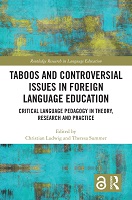Chapter 1 Approaching Taboos and Controversial Issues in Foreign Language Education
Proposal review
Author(s)
Ludwig, Christian
Summer, Theresa
Language
EnglishAbstract
Taboos are not a new phenomenon. Yet, taboos change over time as social customs change, discard old taboos, and create new ones. What does not change, however, is how taboos regulate the way in which we live together in different communities and how they influence our behaviours. Notwithstanding the ubiquity of all sorts of taboos in daily life, many of them do not seem to find their way into foreign language classrooms easily. This is particularly surprising if we consider the growing importance of critical language pedagogy approaches to foreign language learning. Despite relevant efforts there, teachers, pre-service teachers, and learners often appear to feel discomfort as conversations about controversial issues such as mental illnesses, disabilities, racism, conspiracy theories, violence, and gender unfold. Consequently, classroom materials as well as suitable approaches to these issues in foreign language learning are needed. Taking this as a starting point, this introductory chapter argues for the integration of taboos and controversial topics into the foreign language classroom. It first investigates the concept of critical pedagogy in general and critical (foreign) language pedagogy more specifically. It then discusses taboos in the context of critical language pedagogy, arguing that despite numerous challenges, the foreign language classroom provides the perfect space for discussing some controversial topics with students—primarily by exploring a variety of different texts dealing with taboos instead of personalising a topic, which would be more common in communicative approaches. The chapter closes with a practical framework that provides suggestions for handling taboos in foreign language education.
Keywords
Critical language pedagogy; taboo topics; controversial topics; PARSNIP; foreign language education; foreign language teaching; foreign language learning; critical literaciesDOI
10.4324/9781003220701-2ISBN
9781032116075, 9781032116105, 9781003220701Publisher
Taylor & FrancisPublisher website
https://taylorandfrancis.com/Publication date and place
2023Imprint
RoutledgeClassification
Education


 Download
Download